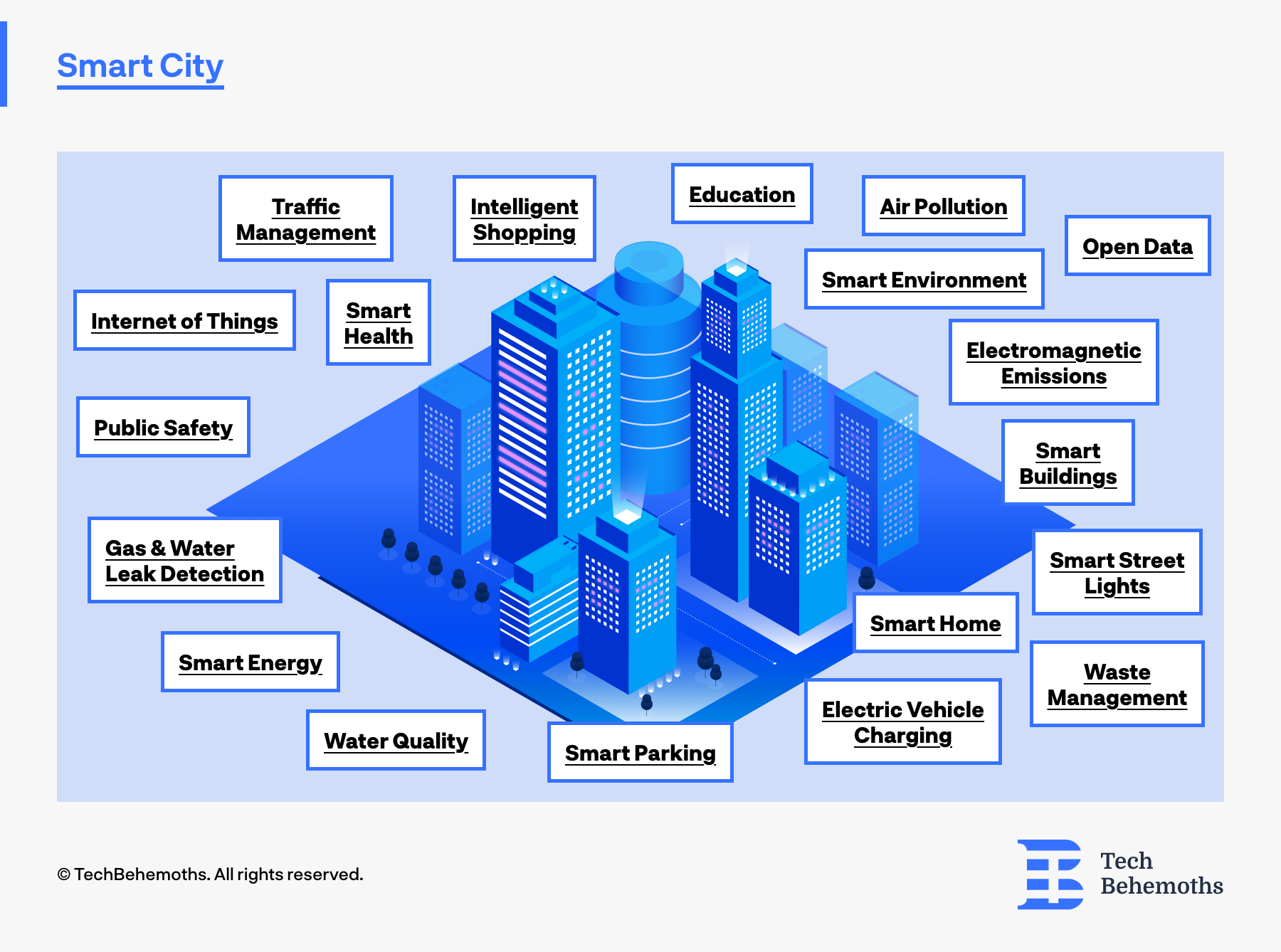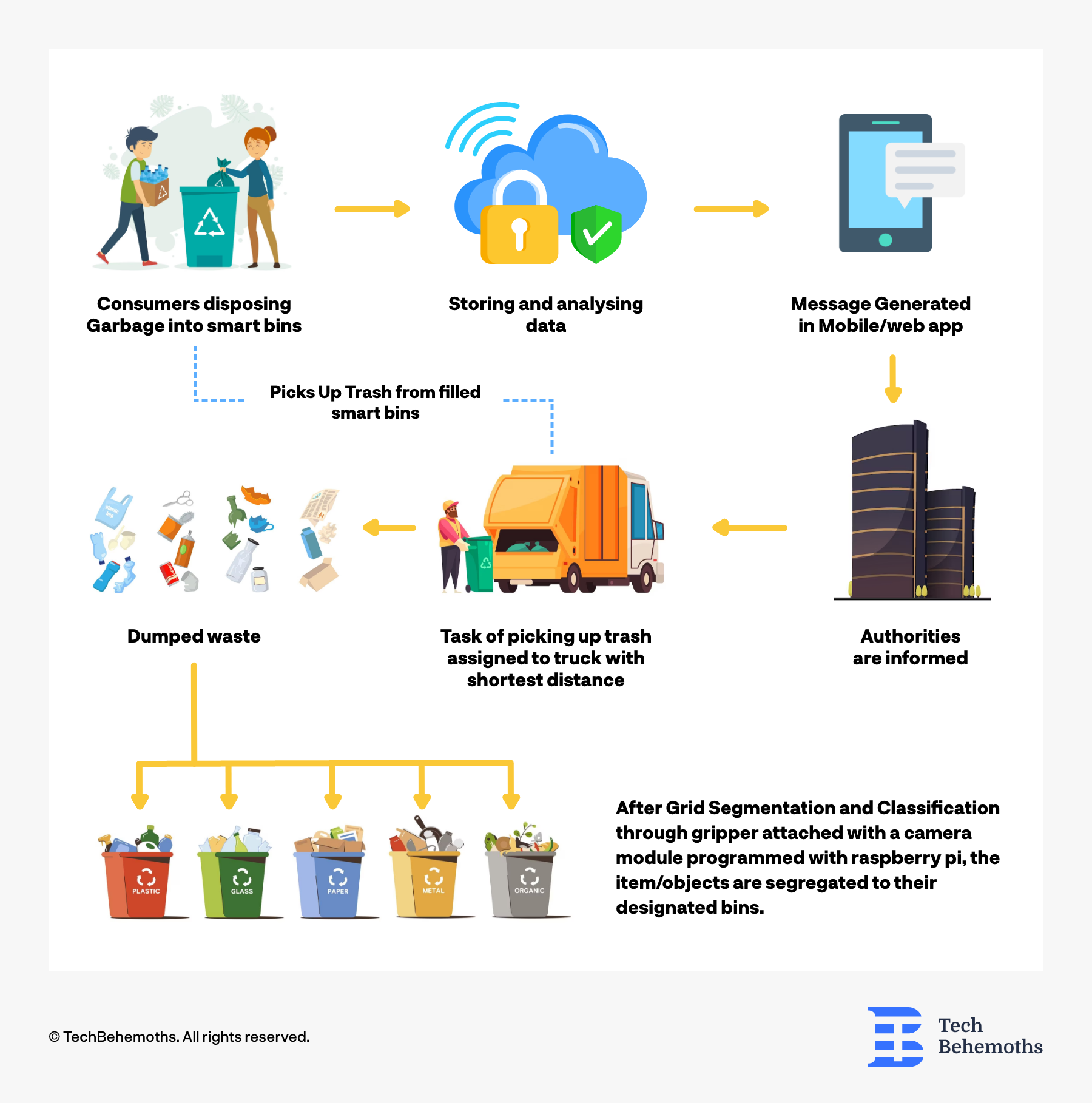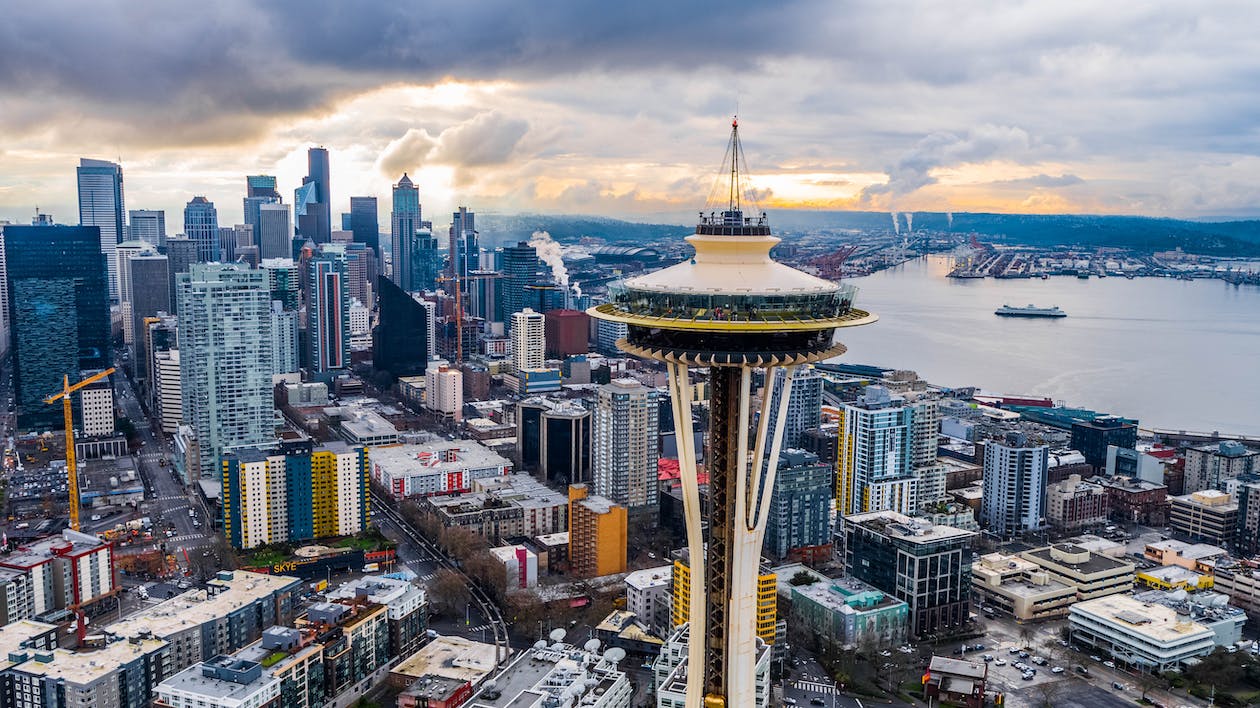Top 5 Smart Cities in the US in 2025

Summary
-
Smart cities use IoT, data, and tech to boost sustainability, safety, and efficiency to improve infrastructure, services, and citizen well-being.
-
Top US leaders:
-
New York – smart grids, Wi-Fi, open data.
-
San Francisco – bike-sharing, parking sensors, smart bins.
-
Seattle – clean energy, EV charging, digital equity.
-
Boston – smart lighting, free Wi-Fi, innovation labs.
-
Chicago – IoT traffic, predictive policing, citizen engagement.
-
-
By 2030, smart cities will feature renewable energy, autonomous transport, personalized services, and stronger cybersecurity.
As the urban population continues to grow, it becomes essential that cities find innovative solutions that promote sustainability and improve the quality of life for their citizens.
Smart cities are transforming the way we live, work, and interact in urban environments. These cities increase their residents' efficiency and overall well-being by integrating technology, data, and connectivity.
This article will explore what a smart city is and how smart cities work. We'll uncover the top US smart cities that exemplify the successful implementation of smart initiatives, making them leaders in urban innovation.
What is a smart city, and how does it work?

Let's start by defining a smart city. - A smart city is a modern city that relies on various technologies used to collect and analyze data to function efficiently.
Internet of Things (IoT) devices and sensors are placed around the city to collect valuable data on everything from traffic patterns and air quality to energy use and waste management. This data is then analyzed using advanced analytics tools and machine learning algorithms.
By analyzing data, city officials can make informed decisions and implement strategies to improve infrastructure, public utilities, and services, reduce energy consumption, optimize transportation systems, enhance public safety, and solve problems in different city areas.
How are smart cities selected?
The process of selecting smart cities can vary depending on the country, region, and specific objectives of the initiative. However, there are several defining criteria of what makes a "smart" city:
- Smart infrastructure -The technology is used to manage transport, energy, and water systems. Intelligent transport systems improve traffic flow, optimize public transport routes and provide real-time information. These include features such as smart parking and smart traffic management.
-
Sustainability and efficient utilities - A priority in a smart city is sustainability. Smart cities use advanced monitoring systems to optimize energy use, detect water leaks and manage waste. This improves resource management, reduces costs, and promotes the sustainable use of utilities.
-
Citizen involvement - Smart cities use digital platforms to engage with residents and gather feedback. This enables the active participation of citizens in decision-making processes, thus improving public services.
-
Data-driven governance -Smart cities rely on data analytics and real-time information to make informed decisions and improve governance. This includes using predictive analytics for crime prevention, emergency response optimization, and urban planning.
When it comes to implementing smart city solutions, it's crucial to consider a city's readiness and capacity. This means considering various factors like having a skilled workforce available, having the administrative capacity to handle the changes, having sufficient financial resources, and being open and willing to embrace new technologies and practices.
It is important to mention that the smart city concept is continuously evolving, and different cities may emphasize other aspects depending on their unique needs and priorities.
That being noted, let's see the leading smart cities in the US.
New York City, NY

One of the largest and most diverse cities - New York has established itself as a global leader in smart city development.
The city has implemented various projects that contribute to its smart city status.
Here are some of them:
- Smart grid systems promote the modernization of the electricity network through which New Yorkers have access to more affordable electricity and a more reliable energy system.
- The LinkNYC project offers free Wi-Fi and charging stations in all five boroughs, providing residents and visitors with seamless connectivity.
- NYCx Moonshot Challenge invites individuals and organizations to propose transformative ideas to improve New Yorkers' lives. Winners receive support and funding to bring their ideas to life, encouraging innovation in the city.
New York City's smart traffic management system also utilizes real-time data from GPS devices, traffic cameras, and mobile apps to monitor and manage traffic flow, reduce congestion, and improve public transit services.
Smart traffic lights dynamically adjust signal timings based on traffic conditions, optimize traffic flow and reduce travel times. Incorporating features such as gunshot detection and emergency call boxes enhances public safety.
Advanced video surveillance systems equipped with facial recognition and object detection capabilities enable law enforcement agencies to monitor public spaces effectively.
The city promotes energy-efficient buildings by utilizing smart automation systems that optimize heating, cooling, and lighting based on environmental conditions.
New York City has implemented various digital platforms to engage residents and promote citizen participation. These platforms provide access to public services and enable online voting and feedback mechanisms. Here are some examples:
- NYC311 platform, which allows residents to access a wide range of non-emergency city services, report issues, and make service requests
- Notify NYC, which provides residents with real-time emergency notifications about emergencies, weather events, traffic disruptions, and other important information.
- NYC Open Data, an online portal that provides access to a vast array of datasets from different city agencies through which residents can contribute to data-driven decision-making processes.
Open data initiatives make government data available to the public, promoting transparency and enabling developers to create innovative applications and solutions.
It is good to know that New York City continues to explore new technologies and strategies to strengthen its status as a smart city further.
San Francisco, California

San Francisco, CA, is often known as the world's tech capital.
The city has implemented various smart technologies and adopted notable projects highlighting San Francisco's transformation into a smart city.
Here are a few of them:
Smart Transportations initiatives for more efficiency.
-
The city has a bike-sharing program called Ford GoBike, which provides residents with access to shared bicycles through a network of docking stations, encouraging the use of electric vehicles.
-
Another notable initiative is the SFpark program, which utilizes smart parking meters and sensors to provide real-time parking availability information, helping drivers find parking spots more easily.
-
San Francisco Municipal Transportation Agency (SFMTA) has introduced real-time information systems, enabling residents to track bus and train arrivals through mobile apps.
The city has implemented smart waste management systems.
One example is the installation of smart trash cans equipped with sensors that monitor fill levels. These sensors transmit data to waste management teams, enabling them to optimize collection routes and reduce unnecessary pickups.

The city has also implemented ShotSpotter, a system that uses acoustic sensors to detect and locate gunshots in real time, allowing law enforcement agencies to respond quickly to incidents and improving public safety.
At the same time, San Francisco Public Utilities Commission has deployed smart water meters, allowing residents to monitor their water usage and conserve water, also benefits from the implementation of IoT sensors that track air quality and contribute to the city's efforts to combat pollution and create a healthier environment for all.
San Francisco utilizes digital platforms and mobile applications to engage with citizens and gather feedback on city projects. Platforms like Neighborland and SF Planning Connect facilitate community input, enabling residents to participate in urban planning.
As we can see, the city is actively implementing various smart city projects to improve the life of its citizens.
Seattle, Washington

Seattle is s often recognized as a leading smart city due to its innovative initiative.
The city has a high-speed fiber-optic network that supports efficient communication and data transfer across various sectors.
It is strongly dedicated to being environmentally friendly and has taken several steps to promote clean energy and reduce its carbon footprint. For example, Seattle City Light has introduced a project called Advanced Metering Infrastructure, which enables better control of energy consumption.
The city has implemented an extensive network of electric vehicle charging stations and bike-sharing programs. One example is the Seattle Department of Transportation's (SDOT) Smart Mobility Program, which helps improve transportation, ease traffic congestion, and provide smart parking solutions.
Seattle recognizes the significance of digital equity. The city has implemented various programs to provide affordable internet access and devices to low-income residents. Initiatives like the Seattle Public Library's "Internet Hotspot" and the Technology Matching Fund are designed to promote digital inclusion and ensure that all residents have equal opportunities in the digital realm.
Seattle uses technology to improve public safety and emergency response. They have a system called AlertSeattle that sends immediate emergency alerts to residents through various communication channels.
Through these and other initiatives, Seattle strives to improve the lives of its residents and address urban challenges efficiently, making it a prime example of a smart city.
Boston, Massachusetts

Boston is often recognized as one of the leading cities in the United States and globally.
It is frequently mentioned among the top smart cities due to its significant technological investments. Several organizations and reports, such as the Smart Cities Index by IESE Business School and the Smart Cities Council, have acknowledged Boston's efforts and positioned it favorably in their assessments of smart cities.
Boston is home to numerous tech companies, startups, and research institutions that foster innovation and contribute to the city's reputation as a center for cutting-edge technology.
Boston's innovative parking apps guide drivers to available parking, minimizing congestion and improving urban mobility. Boston's Go Boston 2030 initiative encourages alternative modes of transportation and uses data analytics to optimize traffic flow.
The city has implemented smart lighting systems that adjust the brightness based on real-time conditions, reducing energy consumption and pollution.
The city has also installed free public Wi-Fi in several locations, including parks, libraries, and municipal buildings, ensuring connectivity for residents and visitors.
Boston actively engages its citizens through technology platforms. The CityScore program integrates data from various departments to create a real-time snapshot of the city's performance, allowing residents to monitor the progress and participate in decision-making processes.
The city's universities and research institutions in Boston join forces with industry partners to establish digital innovation labs. These labs are crucial in advancing AI, robotics, and data analytics. It's worth highlighting that MIT and Harvard, in particular, actively contribute to research and development efforts, propelling various smart city projects in Boston.
Boston showcases its dedication to employing technology and innovation to address urban challenges positioning itself as a leader in smart city initiatives.
Chicago, Illinois

Chicago is recognized as one of the leading smart cities in the United States. It has been at the forefront of implementing innovative technologies to improve urban living.
Here are several arguments that showcase Chicago's smart city features.
The city has deployed a high-speed fiber optic network, which provides fast and reliable internet access.
Chicago utilizes IoT technology to improve city services and residents' quality of life. For example, smart traffic management systems were implemented to optimize traffic flow and reduce congestion. Additionally, smart parking meters provide real-time information on parking availability, reducing search time. These IoT initiatives have made commuting and parking in Chicago more efficient and convenient.
Chicago is prioritizing sustainability and the environment as part of its smart city vision. They've installed smart sensors in streetlights to adjust the brightness based on real-time conditions, saving energy. Additionally, Chicago has introduced smart grid technology for better energy management, promoting efficiency and reducing carbon emissions.
Chicago has implemented smart technologies to enhance public safety and emergency response. Predictive analytics identify high-risk crime areas, helping law enforcement allocate resources effectively. Integrating video surveillance systems with advanced analytics enables real-time monitoring and faster incident response.
Chicago actively involves its citizens in shaping the city's future through digital platforms and engagement initiatives. The 311 system allows residents to report issues and request services, while social media fosters communication and feedback, promoting community participation and collaboration.
Therefore, Chicago's achievements in areas such as open data policies, IoT applications, and environmental sustainability have attracted the attention and recognition of smart city experts and organizations.
Austin, Texas

Austin has a reputation for being one of the most innovative cities in the US, home of SXSW, and a growing number of tech startups. It has implemented intelligent traffic management systems, public Wi-Fi networks, and initiatives to promote energy efficiency and renewable energy.
For example, the city’s Smart Mobility Program uses real-time data to optimize traffic lights and reduce rush-hour congestion. Pilot projects with autonomous shuttles (such as the EasyMile autonomous shuttle tested at UT Austin) demonstrate how Austin is experimenting with the future of urban transportation.
Tesla’s robotaxi service is opening to the public next month, marking a significant step toward broader autonomous transportation—although safety operators are still required.
Sustainability is another priority. Austin Energy, the city’s utility, operates one of the nation’s largest community solar programs, while its Austin SHINES project integrates smart grids and battery storage to improve energy efficiency.
Citizen input is also a cornerstone—residents can share feedback on zoning, bike lanes, and urban planning through digital platforms like SpeakUp Austin. SpeakUp Austin. The research group at UT Austin is also pioneering an “AI system that links city datasets… develops digital twin models for critical infrastructure”—a key smart city application in efficient urban planning.
Bringing together everything from smart grids to autonomous mobility and AI-powered city management, Austin combines public-private partnerships, citizen engagement, and university-led innovation.
Smart Cities in 2030
What will a smart city look like in 2030? - It may be challenging to answer.
However, some features may be relevant in smart cities by 2030.
-
High-speed connectivity, with 5G and possibly even 6G networks in place
-
Renewable energy sources, such as solar and wind, are expected to play a more significant role; cities will l integrate smart grid systems to optimize energy distribution and reduce wastage.
-
Energy-efficient buildings, smart waste management systems, urban agriculture, and climate change mitigation strategies will play a significant role in creating environmentally sustainable cities.
-
By 2030, we can expect autonomous vehicles (AVs) to play a more significant role in smart cities, providing safer and more efficient transportation options.
-
Smart cities will focus on resilience and safety, incorporating technologies to detect and respond to natural disasters, security threats, and emergencies.
-
Smart cities will prioritize citizens' needs. Personalized services will be commonplace, such as smart healthcare systems, efficient public transportation, smart homes, and participatory platforms for citizen feedback and engagement.
-
Digital security - with increased connectivity and data sharing, smart cities will prioritize robust cybersecurity measures to protect infrastructure, networks, and personal data.
Implementation and development will vary in different regions and depend on local priorities, resources, and technological advances. But new technological innovations and societal changes may shape the smart cities of 2030 in unexpected ways.
Conclusion
By understanding the concept of a smart city and how it functions, we have witnessed the remarkable progress made by cities that have embraced technology and innovation to enhance the quality of life for their residents.
The five smart cities we have featured have demonstrated exceptional dedication to transforming their urban landscapes into interconnected hubs that prioritize sustainability, efficiency, and improved citizen services.
Looking ahead to 2030, we can expect these smart cities to continue evolving and pushing the boundaries of what is possible, embracing new technologies and ideas to create an interconnected, sustainable, and truly smart future.
Would you like to work with IT companies from these cities? If yes, you can tap into a vast network of companies in these forward-thinking urban centers to find your IT service provider on TechBehemoths. This will enable you to connect with service providers that are well-versed in the latest advancements.
Related Questions & Answers
What are the main benefits of smart cities?
How do smart cities use IoT?
What challenges do smart cities face?
Are smart cities only about technology?